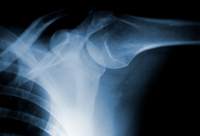 Injuries to the shoulder area are especially common among athletes and injured workers. If you’re high up on a ladder and fall on a concrete surface, it’s likely your shoulder will take the brunt of the impact.
Injuries to the shoulder area are especially common among athletes and injured workers. If you’re high up on a ladder and fall on a concrete surface, it’s likely your shoulder will take the brunt of the impact.
Following injuries like this, many Colorado workers and athletes undergo shoulder pain surgery to mitigate the effects of the fall.
Once the surgery is complete, surgeons would sometimes directly inject pain medication into the shoulder. Over the last couple of years though, patients have shown signs of complete cartilage breakdown in their shoulders. This condition is technically known as postarthroscopic glenohumeral chondrolysis, or PAGCL.
While videos and advisories from the U.S. Food and Drug Administration have alluded to the connection of pain pumps and this debilitating condition, many injured workers and athletes are claiming the direct injection of pain medication into their shoulder(s) is making matters worse, not better.
Many doctors are advising the injection be limited to the soft tissue surrounding the shoulder and not the shoulder itself. This method in fact is the only one approved by the FDA.
Direct injection of pain medication to the shoulder generally leads to some irreversible damages in patients. Many are considering legal action to obtain compensation for damages stemming from this terrible situation.
According to the FDA, the question remains as to why. What attributes of shoulder pain pump injections lead to a breakdown in cartilage in the shoulder? Is it the drugs themselves, the materials in the infusion (pain pump) device or a combination of both?
Regardless of this question, manufacturers of local anesthesia have been asked by the FDA to include warnings to patients about the dangers of direct injection. Pain pump manufacturers have also been asked to include these warnings.
Since shoulder cartilage doesn’t regenerate, patients who lose it must undergo a complete shoulder replacement.
Injured workers and athletes in Colorado need to be aware of this fact when addressing shoulder pain. Be sure you obtain the opinion of different surgeons before opting to have pain medication injected directly in your shoulder.
Remember, injured workers must follow a certain process for obtaining 2nd and 3rd medical opinions as per Colorado workers’ compensation statutes.
If you’ve experienced adverse affects from a pain pump (post-surgery) or if you’ve sustained a major shoulder injury on-the-job that may require surgery, contact Denver workers’ compensation attorneys at the Babcock Law Firm today to discuss your case.
Ensure you’re not stuck with a condition that’s even more difficult to overcome. Worse yet, don’t get stuck with a condition that you will end up having to pay to get fixed.

